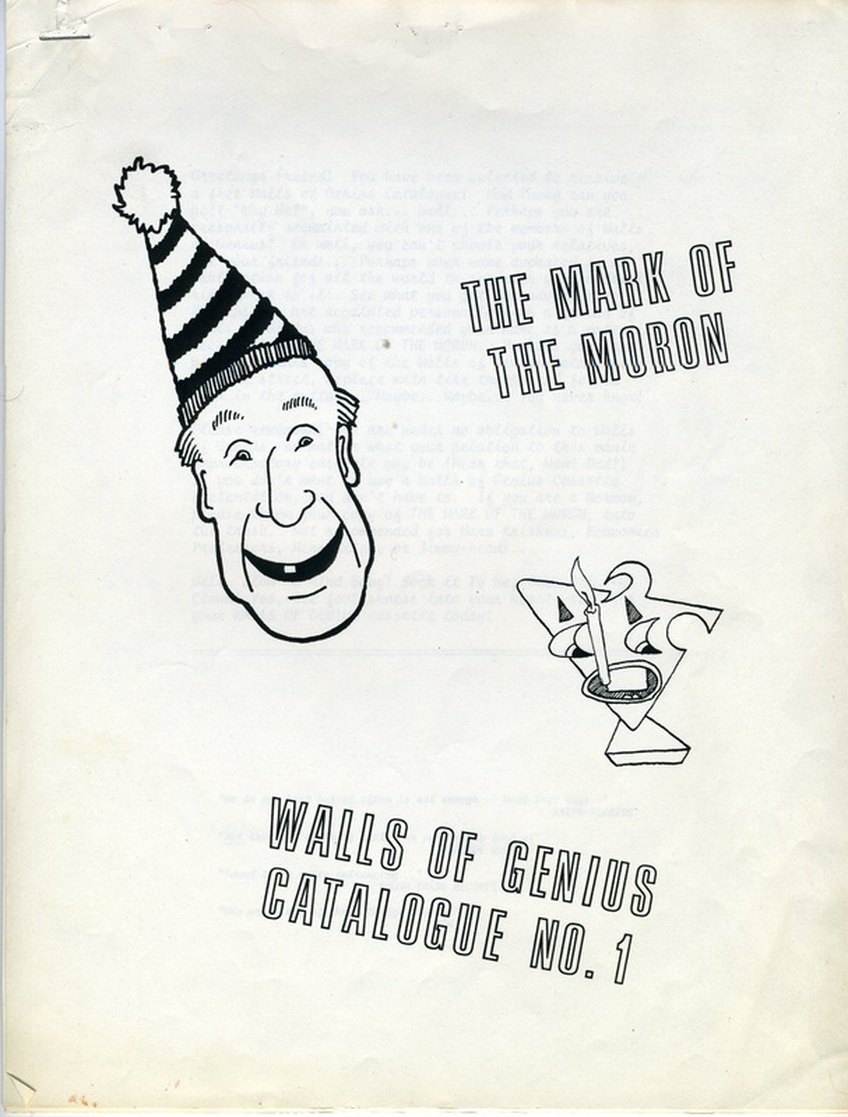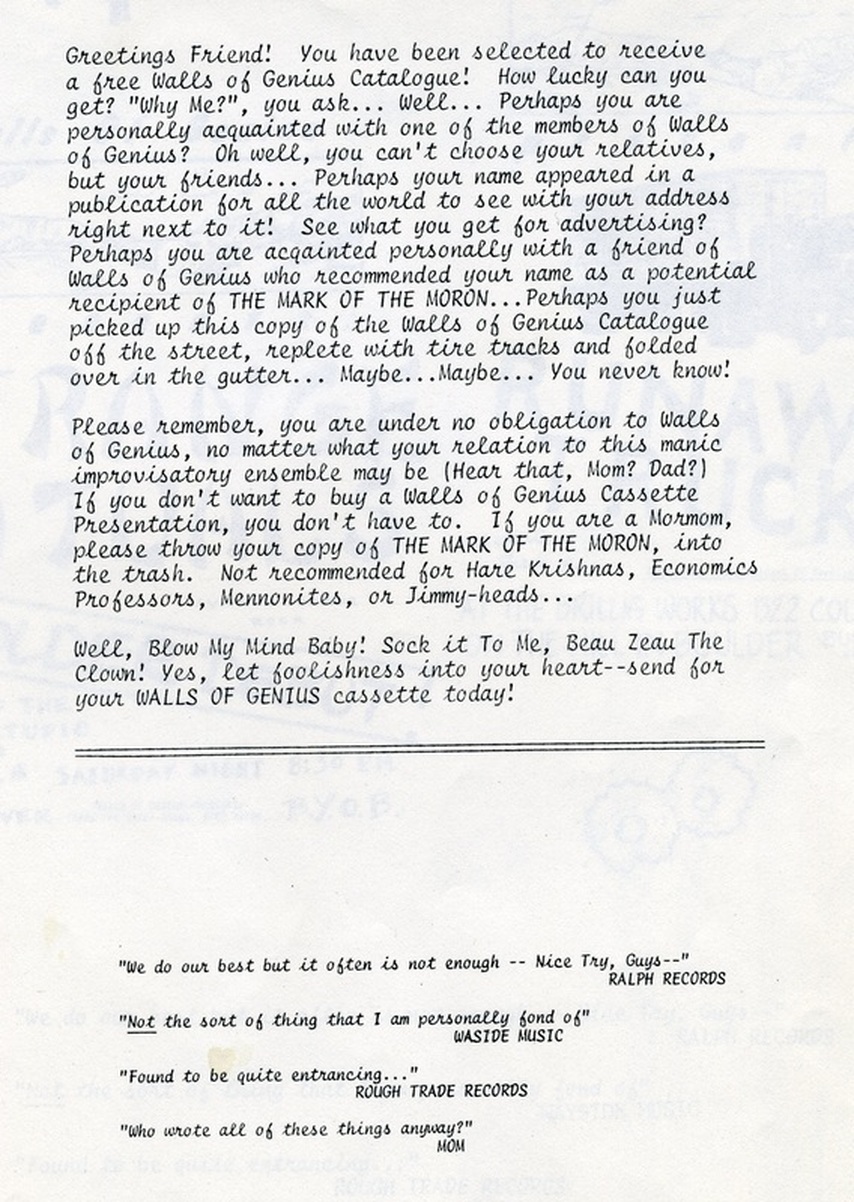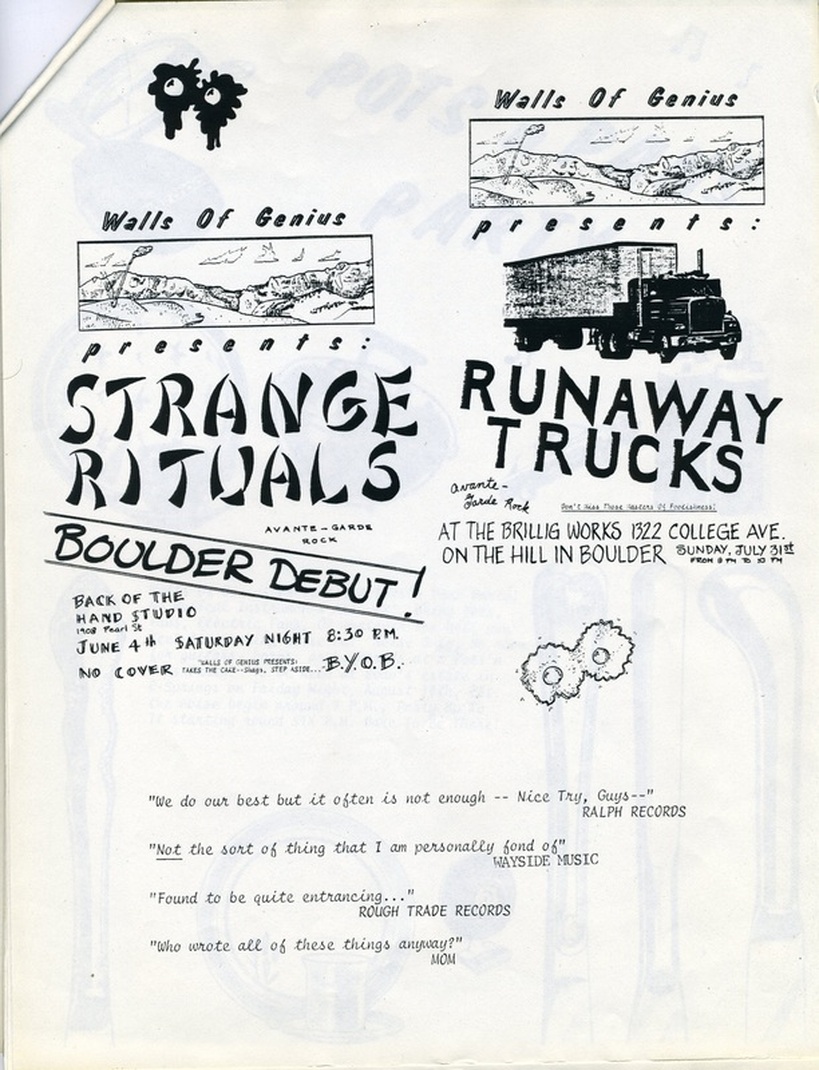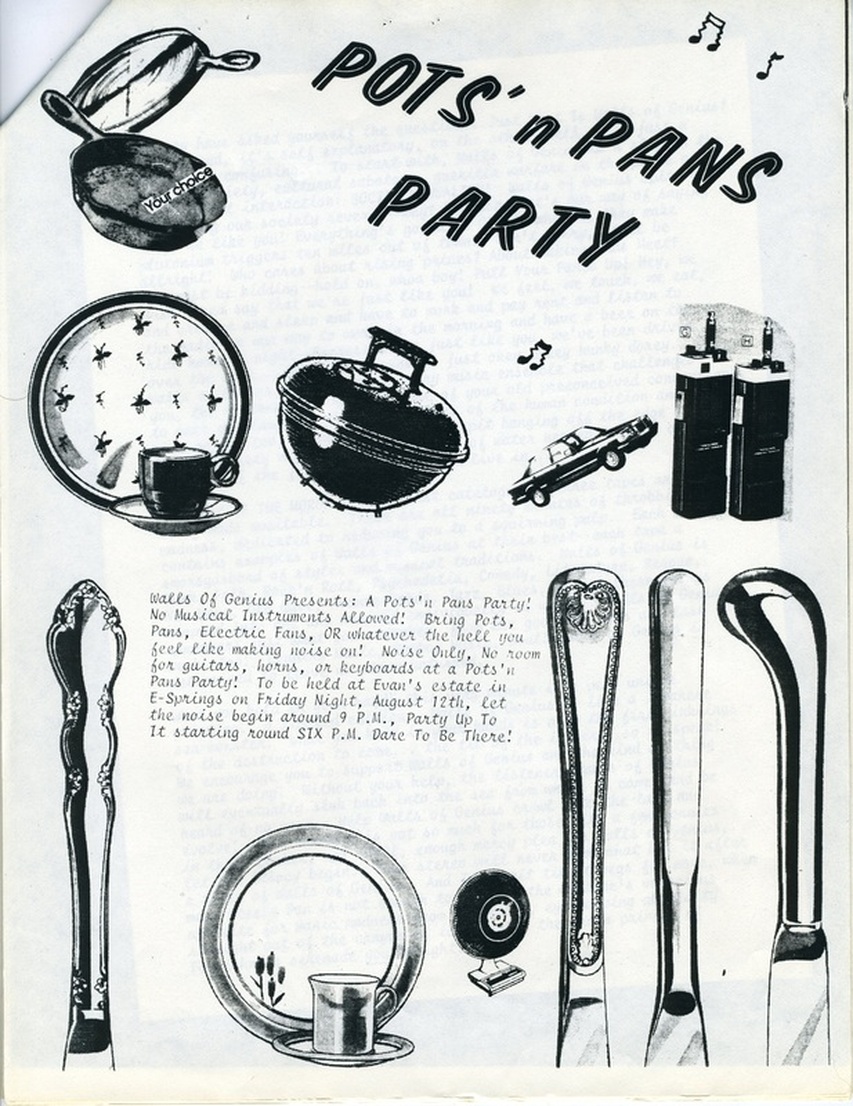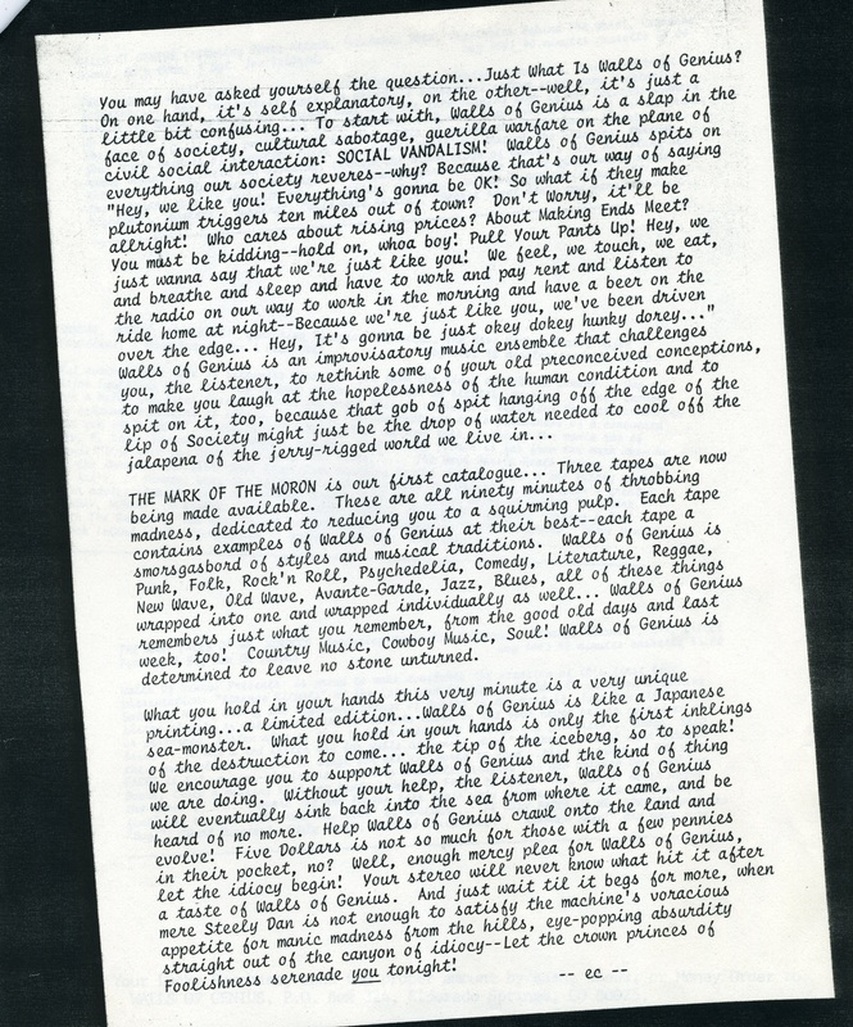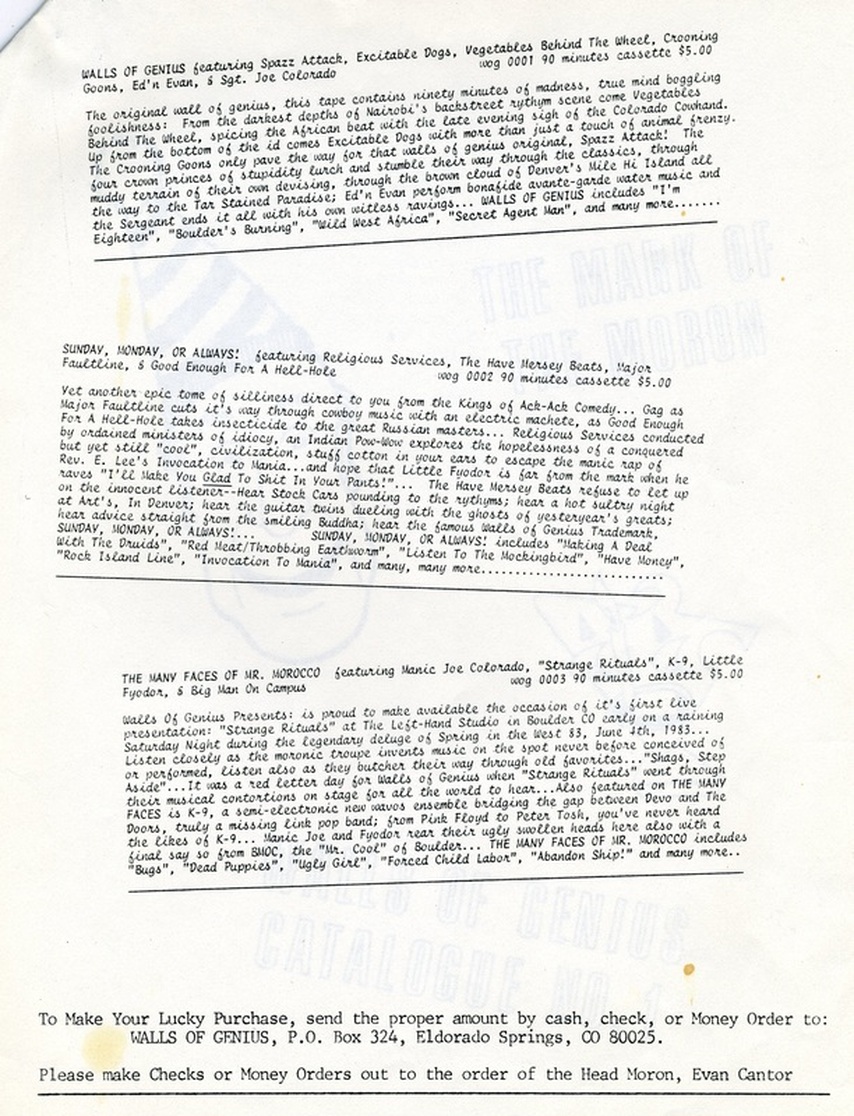Walls Of Genius Catalogue #1
The Mark Of THe Moron
LF:
"Mark of the Moron", as with all of our catalogs and just about all of our art and marketing, was entirely Evan’s doing. He occasionally incorporated doodles of mine or Ed’s, but otherwise the art and layout and text of the catalogs are all his, and this one is indeed 100% Evan, including the title, another fine example of his alliterative literation.
Evan had already been mixing down his favorite parts of multiple jam sessions onto 90 minute cassettes by the time I’d told him about this magazine I’d seen in the KGNU studio called Op. I told him there was an article by Fred Frith in it and he said, “Fred Frith’s magazine?? Let’s see it!!!” We were then amazed to see Robin James’ column "Castanets" which was dedicated entirely to reviewing cassettes that had been sent to him. This was probably the single biggest thing that spurred us into thinking of this endeavor as a veritable project to share with the world and possibly even make some money on. At the risk of embarrassing Evan, he once even spoke of eventually shifting to part time at his day job as we made money at Walls Of Genius! Of course, I can’t talk cause it seemed to make sense to me!
Making a catalog was the next step in this process of sharing and selling the fruits of our activities. I don’t know what a marketing expert would think of the approach taken, but Evan’s prose never fails to entertain as far as I’m concerned! In addition to the front cover, a listing of the tapes available thus far at the end, and Evan’s spiels introducing the reader to WoG and making his case for why you should buy our cassettes, there are flyers for our first two live performances and an invitation to the Pots ‘n’ Pans Party, a found objects only recording session (and party!!) to be held in the near future. I think the idea for the Pots ‘n’ Pans Party was something we came up with via mutual brainstorm, though I imagine the finalization of the concept was Evan’s. Hell, it was being held at his place!
EC:
Once David turned me on to Op magazine, which he had discovered at KGNU radio, it was clear that we could find an audience for what we were already doing. Up to that point, we were just doing it for ourselves, so to speak. We started sending out tapes for review and comment. We garnered instant attention in this underground press, probably because what we were doing was so unique. By the time the "Mark" catalog was coming out, we had three full 90-minute titles, with a 4th to be released shortly. The catalog was an introduction of sorts, to introduce Walls Of Genius to a larger home-taper/do-it-yourself community. We were collecting addresses of people in this community and trading tapes, so this became the seed of our mailing list.
Chances are this catalog was printed on a xerox machine at my place of work, surreptitiously.
Catalog page descriptions below by EC.
"Mark of the Moron", as with all of our catalogs and just about all of our art and marketing, was entirely Evan’s doing. He occasionally incorporated doodles of mine or Ed’s, but otherwise the art and layout and text of the catalogs are all his, and this one is indeed 100% Evan, including the title, another fine example of his alliterative literation.
Evan had already been mixing down his favorite parts of multiple jam sessions onto 90 minute cassettes by the time I’d told him about this magazine I’d seen in the KGNU studio called Op. I told him there was an article by Fred Frith in it and he said, “Fred Frith’s magazine?? Let’s see it!!!” We were then amazed to see Robin James’ column "Castanets" which was dedicated entirely to reviewing cassettes that had been sent to him. This was probably the single biggest thing that spurred us into thinking of this endeavor as a veritable project to share with the world and possibly even make some money on. At the risk of embarrassing Evan, he once even spoke of eventually shifting to part time at his day job as we made money at Walls Of Genius! Of course, I can’t talk cause it seemed to make sense to me!
Making a catalog was the next step in this process of sharing and selling the fruits of our activities. I don’t know what a marketing expert would think of the approach taken, but Evan’s prose never fails to entertain as far as I’m concerned! In addition to the front cover, a listing of the tapes available thus far at the end, and Evan’s spiels introducing the reader to WoG and making his case for why you should buy our cassettes, there are flyers for our first two live performances and an invitation to the Pots ‘n’ Pans Party, a found objects only recording session (and party!!) to be held in the near future. I think the idea for the Pots ‘n’ Pans Party was something we came up with via mutual brainstorm, though I imagine the finalization of the concept was Evan’s. Hell, it was being held at his place!
EC:
Once David turned me on to Op magazine, which he had discovered at KGNU radio, it was clear that we could find an audience for what we were already doing. Up to that point, we were just doing it for ourselves, so to speak. We started sending out tapes for review and comment. We garnered instant attention in this underground press, probably because what we were doing was so unique. By the time the "Mark" catalog was coming out, we had three full 90-minute titles, with a 4th to be released shortly. The catalog was an introduction of sorts, to introduce Walls Of Genius to a larger home-taper/do-it-yourself community. We were collecting addresses of people in this community and trading tapes, so this became the seed of our mailing list.
Chances are this catalog was printed on a xerox machine at my place of work, surreptitiously.
Catalog page descriptions below by EC.
The lettering on the title page was done with Letraset. I knew about Letraset rub-on lettering via my father's architecture business, which also explains my mostly legible handwriting. I had always doodled cartoons of funny faces and this became an outlet for them. The "Moron" with the striped wizard cap is a defacto caricature of Hugh McCaffrey, the owner and president of the Trust Company of America, where I worked at the time. McCaffrey was a bit of an old-fashioned capitalist corporatist autocrat. I recall seeing accounts showing that he earned over $100,000/yr while the Vice President, next in the heirarchy, made $28,000/yr. I worked there for $950/month. The other drawing is just an abstract face with a candle for a nose. Both drawings were made with pen-and-ink.
This is my first catalog spiel. This explains how "you" got on the mailing list. You can tell we've already absorbed a western sense of humor, invoking Mormons to just throw the thing away. We're also poking fun at "Jimmy-heads". I have no idea what such a thing is, I probably made it up because it sounded funny. On this page, you see quotes. Ralph Records told us "nice try, guys". Wayside Music, an underground distribution service that mainly trafficked in prog-rock, said "not the sort of thing I am personally fond of". Rough Trade Records "found (us) to be quite entrancing..." but thought we were too literary for their audience. Mom just asked "who wrote all of these things anyway?", proof that I shared some of this music with my parents.
The third page has 2 flyers, one for the Strange Rituals show and another for Runaway Trucks, upcoming. The quotes appear once again. There are two small pen-and-ink drawings, one of splattered eggs and another of eggs sunny-side-up. This possibly hearkens back to flyers I made for parties at the TKE fraternity house, most notably a party that we called "Brain Fry", that featured a drawing of a frying pan with a brain in it. I was the kitchen manager at that time and convinced one of the brothers to pay back his debt to the house kitchen by giving away fifty hits of LSD at a party, the "Brain Fry". So these are egg frying images instead. "Runaway Trucks" was a name I came up with, as I was very impressed by the runaway truck ramps on the mountain highways in Colorado. Many many years later, a jam-grass band emerged from Colorado called Runaway Truck Ramp. No relation to us at all. Also notice that I didn't know how to spell "avant-garde". By the second show, we were billing ourselves as "masters of foolishness".
Page 4 is the flyer for the Pots'n Pans party (which would be held on August 12, 1983), essentially a found-objects jam session and party combined. The lettering is Letraset once again and some typewriter text, plus images pulled from the newspaper and cut-and-pasted.
My second spiel, introducing Walls Of Genius, is an attempt to promote and describe what we were doing. "A slap in the face of society" describes our own personal anomie. "Cultural sabotage" describes what we were doing in cover versions of pop songs. "Guerilla warfare on the plane of civil social interaction" describes our hopefully seditious attempts at examining and satirizing average American concerns and obsessions. "Social vandalism"--again, another clever phrase attempting to describe our rejection of the mainstream. That we should "spit on everything our society reveres" means not only that we reject celebrity culture and everything that we see advertised and promoted in the mainstream culture, it means that we are actively deconstructing society's norms.
All of this is followed by a nihilistic invocation that Walls of Genius "likes you", meaning the reader. I reel off a short list of horrors: the Rocky Flats atomic bomb factory just up the road from Boulder, making ends meet and rising prices. A concern over "rising prices" emphasizes the fact that David and I were both working for peanuts in those days. I was also quite disillusioned with Reagan's "morning in America". What was a wake-up call from the sixties/seventies for Ronald Reagan was a hideous rejection of idealism for many of us. I think that David and I had both absorbed existentialist philosophy to the extent that, for the first time in our lives, I was seeing a cynical nihilistic greed-based culture take over what had always been an upwardly hopeful curve during our own lifetimes. Growing up in the 60s and going to college in the 70s, nearly our entire lives had been in witness to tremendous positive social development in America. With the advent of Reagan, it collapsed. No more Kennedy optimism. The culture had now been hijacked by smiling laissez-faire free-market trickle-down greedheads. So, Walls of Genius is putting out the message here that "we're just like you, we've been driven over the edge". Over the edge is exactly where we've gone and will continue to go, cliff-diving off the rim of the mainstream. We are hoping that our cliff-diving will provide a vicarious thrill for those who suffer a similar anomie, those who are equally alienated from the mainstream of society. Although we were doing it for ourselves first and foremost, the issuance of the catalog represents a time when we have discovered that an audience exists for what we do. And so we begin, in halting steps, catering to that audience instead of purely doing it for our own entertainment.
The opening paragraph finishes with a description of what Walls of Genius actually "is": an improvisatory music ensemble, etc. We challenge the listener to "rethink...preconceived conceptions". This refers to how you "expect" music to sound. We ask you to "laugh at the hopelessness of the human condition." Which we do aggressively with Walls of Genius, doing so with gusto and enthusiasm. A lot of this is just verbose public-relations blather, designed primarily to be funny and entertaining so that you (the reader) will get sucked in as a listener and a consumer. But it does explicate a mutually unspoken philosophic approach. We never sat down and determined that we would "rethink preconceived conceptions". We simply did it and no discussion was necessary. David and I both had academic backgrounds, and I was rejecting that, too. Daggone professors! It took me ten years to recover from undergraduate education before I was willing to go back to graduate school in my thirties. You can see the satirizing of academia more clearly in my writings as "Professor L. Bottom Eyes". Ed, on the other hand, had rejected academia, dropping out after a semester or two at Colorado State University. He had a well-paying job with Midwest Airlines that didn't require a college degree. If we had tried to discuss Nietzsche, Sartre, Camus or Dostoyevsky with him, he would probably have just laughed in our faces. As far as Ed was concerned, we were just having fun and being funny, not challenging society. And although it's not the entire picture, that's a huge part of my and David's approach also.
The second paragraph of the spiel describes the music on the cassette releases. Pretty self-explanatory, this section is laced with hyperbolic promotion "dedicated to reducing you to a squirming pulp". I still haven't figured out how to spell "avant-garde" correctly. We have set ourselves up to essentially do anything we want, musically speaking. We are threatening multiple genres, "all of these things wrapped into one".
The final paragraph is more verbose public relations, hoping that you (the reader) will send us some money for a cassette tape. We were trading tapes a lot, but we wanted to sell tapes so that we could afford to get more cassettes and "support" the activity. It is rather prescient that I describe the Mark of The Moron catalog as "a very unique printing... a limited edition..." How true it would turn out to be. How many of these catalogs survive from this printing is a matter for speculation. We threaten more "destruction to come"--obviously at this point we think we've got something and we're ready to run with it. The spiel finishes with more verbose hyperbole, "Let the crown princes of Foolishness serenade you tonight!" Note that I am not yet signing these spiels as "Head Moron".
All of this is followed by a nihilistic invocation that Walls of Genius "likes you", meaning the reader. I reel off a short list of horrors: the Rocky Flats atomic bomb factory just up the road from Boulder, making ends meet and rising prices. A concern over "rising prices" emphasizes the fact that David and I were both working for peanuts in those days. I was also quite disillusioned with Reagan's "morning in America". What was a wake-up call from the sixties/seventies for Ronald Reagan was a hideous rejection of idealism for many of us. I think that David and I had both absorbed existentialist philosophy to the extent that, for the first time in our lives, I was seeing a cynical nihilistic greed-based culture take over what had always been an upwardly hopeful curve during our own lifetimes. Growing up in the 60s and going to college in the 70s, nearly our entire lives had been in witness to tremendous positive social development in America. With the advent of Reagan, it collapsed. No more Kennedy optimism. The culture had now been hijacked by smiling laissez-faire free-market trickle-down greedheads. So, Walls of Genius is putting out the message here that "we're just like you, we've been driven over the edge". Over the edge is exactly where we've gone and will continue to go, cliff-diving off the rim of the mainstream. We are hoping that our cliff-diving will provide a vicarious thrill for those who suffer a similar anomie, those who are equally alienated from the mainstream of society. Although we were doing it for ourselves first and foremost, the issuance of the catalog represents a time when we have discovered that an audience exists for what we do. And so we begin, in halting steps, catering to that audience instead of purely doing it for our own entertainment.
The opening paragraph finishes with a description of what Walls of Genius actually "is": an improvisatory music ensemble, etc. We challenge the listener to "rethink...preconceived conceptions". This refers to how you "expect" music to sound. We ask you to "laugh at the hopelessness of the human condition." Which we do aggressively with Walls of Genius, doing so with gusto and enthusiasm. A lot of this is just verbose public-relations blather, designed primarily to be funny and entertaining so that you (the reader) will get sucked in as a listener and a consumer. But it does explicate a mutually unspoken philosophic approach. We never sat down and determined that we would "rethink preconceived conceptions". We simply did it and no discussion was necessary. David and I both had academic backgrounds, and I was rejecting that, too. Daggone professors! It took me ten years to recover from undergraduate education before I was willing to go back to graduate school in my thirties. You can see the satirizing of academia more clearly in my writings as "Professor L. Bottom Eyes". Ed, on the other hand, had rejected academia, dropping out after a semester or two at Colorado State University. He had a well-paying job with Midwest Airlines that didn't require a college degree. If we had tried to discuss Nietzsche, Sartre, Camus or Dostoyevsky with him, he would probably have just laughed in our faces. As far as Ed was concerned, we were just having fun and being funny, not challenging society. And although it's not the entire picture, that's a huge part of my and David's approach also.
The second paragraph of the spiel describes the music on the cassette releases. Pretty self-explanatory, this section is laced with hyperbolic promotion "dedicated to reducing you to a squirming pulp". I still haven't figured out how to spell "avant-garde" correctly. We have set ourselves up to essentially do anything we want, musically speaking. We are threatening multiple genres, "all of these things wrapped into one".
The final paragraph is more verbose public relations, hoping that you (the reader) will send us some money for a cassette tape. We were trading tapes a lot, but we wanted to sell tapes so that we could afford to get more cassettes and "support" the activity. It is rather prescient that I describe the Mark of The Moron catalog as "a very unique printing... a limited edition..." How true it would turn out to be. How many of these catalogs survive from this printing is a matter for speculation. We threaten more "destruction to come"--obviously at this point we think we've got something and we're ready to run with it. The spiel finishes with more verbose hyperbole, "Let the crown princes of Foolishness serenade you tonight!" Note that I am not yet signing these spiels as "Head Moron".
Page 6 lists and describes the three tapes currently available, Walls Of Genius, Sunday, Monday Or Always! and The Many Faces Of Mr. Morocco. You'll note that on this catalog we were using a Post Office Box in Eldorado Springs, Colorado. Checks are to be made to the order of the "Head Moron, Evan Cantor". As far as I can tell, this is the first documented use of "Head Moron" as a title. All this stuff, by the way, was written on a typewriter and then cut-and-pasted onto a "master" sheet for photocopying.
